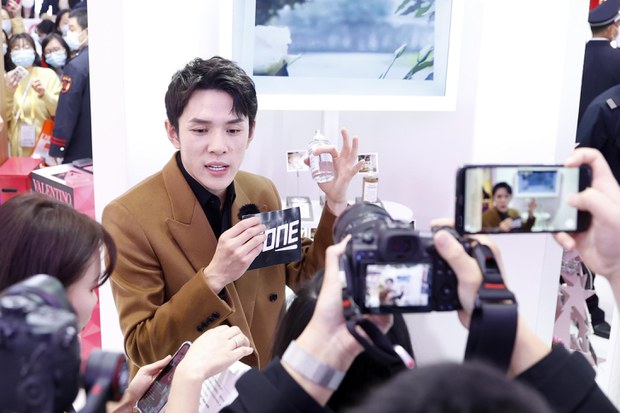China’s ‘Lipstick King’ offers tearful apology
Share

Chinese beauty influencer Li Jiaqi live streams video at the L’Oreal Paris stand during the 3rd China International Import Expo at the National Exhibition and Convention Center on Nov. 5, 2020 in Shanghai, China.
Chinese beauty influencer Austin Li has gotten in hot water before. Last year, he was taken off the air for displaying an ice-cream cake in the shape of a tank of the June 4 anniversary of the 1989 Tiananmen massacre.
This time, the man known as “Lipstick King” — his Chinese name is Li Jiaqi — is facing social media wrath over a disparaging remark to a viewer during a Sept. 10 livestream who said his Florasis brand eyebrow pencil, at 79 yuan ($10.80), was too expensive.
Li told the viewer she should ask herself if she was working hard enough, and when she last got a raise – sparking a deluge of angry reactions online, with viewers citing the wider economic situation as the reason for their lack of spending power.
In response, Li offered a tearful apology online, viewed millions of times.
The hashtag #Austin Li apologizes for his live streaming session remarks# attracted more than 1 billion views on Weibo, according to the Jing Daily news website.
“I said something inappropriate and made everyone uncomfortable. What I said failed to live up to your expectations, and I’m really sorry,” he posted on his Weibo account earlier. “As an anchor, I should always bring positive energy to everyone and learn to control my emotions.”
“Actually, most people are working hard,” netizen @WatchTheRainShowOnASunnyDay commented under Li’s Weibo apology. “It’s not their fault that their wages are low. It’s the general environment.”
@Marilyn_Monsa chimed in from Zhejiang province: “Water can carry a boat but it can also capsize it,” in a metaphor used to refer to the relationship between ordinary people (the water) and those in power (the boat).
Rang hollow
But many commenters said his apologies rang hollow in today’s economic climate, as they came ahead of the Nov. 11 Singles Day, a big shopping event.
“You are apologizing to money, not to us,” wrote @IDon’tWantToPlantTrees from southwestern Sichuan province, while @Chirping said that Li had only apologized to keep his sales numbers high.
“The contract has been signed, so he had no choice but to cry and apologize immediately,” the user wrote.
User @InvincibleSeaAndSky1994 agreed, adding: “The apology was only due to the pressure of public opinion or seeing that losing followers would affect his income. He looks down on ordinary people – what he let slip during the livestream were his true thoughts.”
“Get lost,” wrote @WhatBetterNameShouldIChangeItTo?
The comments and controversy appeared to be untouched by China’s army of internet censors, whose job it is to steer online discussions in a direction preferred by the ruling Chinese Communist Party.
After Li’s tank cake stunt in June 2022, Chinese censors shut down his livestream, and it wasn’t clear if he was further punished. He has gotten back on social media, and has quite a following.
Prominent pro-government media commentator Hu Xijin commented that successful individuals should “respect workers on low incomes and truly empathize with them,” according to comments published by Jing News.
Blue mood
YouTuber and current affairs commentator Wong Kim said the outcry against Li showed that the public mood in China is “not great right now.”
“Everyone knows that things are tough right now,” Wong said. “This is about a livestream anchor who is somewhat removed from the lives of ordinary people.”
Netherlands-based dissident Lin Shengliang said the controversy was also linked to the government’s orchestration of online patriotic fervor to achieve its political and economic goals.
“There is a broader [political] background behind comments like this from internet celebrities,” Lin said.
“These celebrities cash in on patriotic feeling among consumers [who choose to buy Chinese rather than imported goods], and this ties in with the government’s promotion of a closed-loop economy, and self-sufficiency,” he said.
“There is a lot of patriotic and nationalistic consumption happening – particularly in the current environment,” Lin said. “It’s linked to patriotic brainwashing.”
But he said the political and financial elite have scant concern for the hardships suffered by ordinary consumers.
“They don’t care what people on the lower echelons think – they harvest them like leeks,” he said.
Meanwhile, China’s foreign ministry said on Tuesday that the country’s economy is “resilient, and hasn’t collapsed,” after U.S. President Joe Biden called China’s economic situation a “crisis” and Australian Treasurer Jim Chalmers said a slowing Chinese economy could affect economic growth in Australia.
“It seems that there will be various theories of China’s collapse every once in a while,” foreign ministry spokesperson Mao Ning told a regular news briefing in Beijing. “The fact is that China’s economy has not collapsed.”
China’s economic recovery following three years’ harsh COVID-19 restrictions has lost momentum after a brisk start in the first quarter, gripped by weak consumer spending and a deepening property downturn, Reuters reported on Tuesday.
Translated with additional reporting by Luisetta Mudie. Edited by Malcolm Foster.







